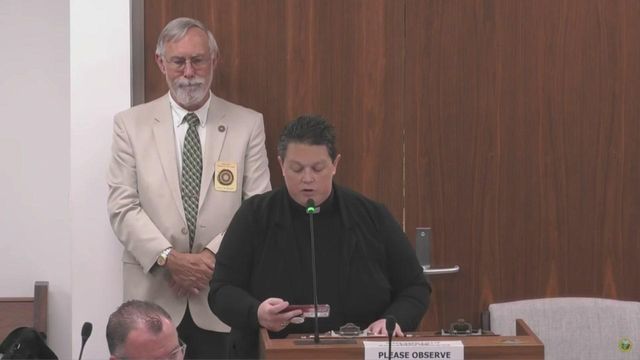Local grants and programs help students navigate the educational challenges of COVID-19

This article was written for our sponsor, MyFutureNC.
According to data from the United States Census Bureau, 93% of households with school-aged children experienced some sort of distance learning since COVID-19. The same report found that lower-income households were significantly less likely to have internet access or the proper technology for distance education.
As a result, millions of students have struggled or fallen behind.
“There were a couple of different things that made a perfect storm,” said Kiera Lindner, a college and career advisory through NC State’s College Advising Corp. “First, limited broadband access, because there's only so many times you can drive to the parking lot of some school or community college to try to get internet. There was also a lack of social interaction.”
For many of the students Lindner advised, she saw an additional challenge: the students needed to generate income for their families.
“I had some students working 60 to 80 hour weeks,” said Lindner. “So many students now had an extra burden of supporting their families after they lost parents, their parents lost jobs or they had a sick parent. School ended up taking a back seat to work and to making sure your family stayed afloat.”
Added family stress and obstacles like lack of technology or unreliable internet may contribute to mental health struggles. In fact, a 2020 poll from Gallup found that nearly 30% of parents surveyed reported mental health issues in their children since the start of distance learning and another 37% said that their child could only handle a few more weeks or months before they would be mentally impacted.
As many students are back to in-person learning, school counselors can help with strategies for closing gaps caused by COVID-19.
“In North Carolina, we’ve created these local networks and local resources. Students should start with their counselor, a college advisor or someone at their school who can help them connect with additional resources,” said JuanEs Ramirez, a state representative for Spanish services at the College Foundation of North Carolina. “Oftentimes they’ll connect students with resources like CFNC (College Foundation of North Carolina) or NCCareers.org. Students can utilize these local resources for free, so they can go in and explore careers, learn more about what skills are needed and even do self-assessments where they can figure out what’s right for them.”
The CFNC website is “a one-stop-shop for everything for planning, saving and applying for college,” said Lindner. The site is available in English and Spanish, and each section is maintained by CFNC and several partners, including Pathways of North Carolina, the North Carolina State Education Assistance Authority and the College Foundation, Inc.
Ramirez also recommends that students complete their FAFSA (Free Application for Federal Student Aid), which can connect them with financial aid opportunities and work-study programs. Since FAFSA evaluates finances from two years in the past and many students’ circumstances have changed in the last two years, professional judgment can help them get more accurate aid.
“Maybe a student’s parents had a job and got laid off during COVID or there have been added medical expenses. Students can talk with colleges and financial aid administrators to appeal the aid. If what they’ve already offered you if it isn't enough, they'll walk you through what documents you would need to submit or what exactly that process looks like — every school has a slightly different set of steps that they follow for that,” said Lindner. “It allows the financial aid officer to then professionally judge whether or not there should be more aid offered and how much, since two years ago looked a lot different financially for a lot of people.”
Other resources students can use include Going Merry, a scholarship matching site, and DREAMers Roadmap, a scholarship matching site specifically for DACA and undocumented students.
Additionally, the Longleaf Commitment Grant, a statewide grant program for North Carolina high school graduates, helps cover tuition and fees for two years at 58 different community colleges.
“For a lot of students, starting at community college and transferring or just getting a degree there has become even more likely as an option for them,” said Lindner. “The Longleaf Grant is really exciting because if students complete their FAFSA and attend a community college, they get free grant money. They don’t have to repay it for both years of community college, so it works out to being essentially free for in-state residents.”
“A lot of students might not even apply even to community college because they don't know how expensive or inexpensive it may be, and they don't want to be a financial burden on their family,” she finished. “They don't think there are resources out there for them depending on their situation, but we want to show them that there really are.”
For Ramirez, the necessity to share these resources is especially important for immigrant families.
“Those students don't qualify for in-state tuition, so there’s such an opportunity for inspiring students and helping them think about the future by providing information on all these options, while at the same time, cultivating their strengths,” said Ramirez. “They just went through a pandemic, and the students are able to overcome challenges. They are resilient. They are inspiring. They’re adaptable and connected to the world. We need to utilize that as a way of showing the students that these are skills they can use in their future and celebrate how far they’ve come.”
In addition to promoting resources that can help these students, Ramirez also emphasized the importance of greater representation.
“Some people are looking through a window, and it's very different when we're able to look at things through a mirror. Seeing a reflection of people that look like us or have a similar upbringing or culture is a very different experience — and that representation really matters,” said Ramirez. “That's something that we need to continue to strive for first-generation students and minority communities — making sure we have a different perspective for looking at policies and laws through different lenses.”
This article was written for our sponsor, MyFutureNC.











